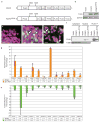Human-specific transcriptional regulation of CNS development genes by FOXP2
- PMID: 19907493
- PMCID: PMC2778075
- DOI: 10.1038/nature08549
Human-specific transcriptional regulation of CNS development genes by FOXP2
Abstract
The signalling pathways controlling both the evolution and development of language in the human brain remain unknown. So far, the transcription factor FOXP2 (forkhead box P2) is the only gene implicated in Mendelian forms of human speech and language dysfunction. It has been proposed that the amino acid composition in the human variant of FOXP2 has undergone accelerated evolution, and this two-amino-acid change occurred around the time of language emergence in humans. However, this remains controversial, and whether the acquisition of these amino acids in human FOXP2 has any functional consequence in human neurons remains untested. Here we demonstrate that these two human-specific amino acids alter FOXP2 function by conferring differential transcriptional regulation in vitro. We extend these observations in vivo to human and chimpanzee brain, and use network analysis to identify novel relationships among the differentially expressed genes. These data provide experimental support for the functional relevance of changes in FOXP2 that occur on the human lineage, highlighting specific pathways with direct consequences for human brain development and disease in the central nervous system (CNS). Because FOXP2 has an important role in speech and language in humans, the identified targets may have a critical function in the development and evolution of language circuitry in humans.
Figures



Comment in
-
Language evolution: The importance of being human.Nature. 2009 Nov 12;462(7270):169-70. doi: 10.1038/462169a. Nature. 2009. PMID: 19907485 No abstract available.
References
Publication types
MeSH terms
Substances
Associated data
- Actions
Grants and funding
LinkOut - more resources
Full Text Sources
Other Literature Sources
Molecular Biology Databases

